3
THEREFORE, IT IS NOT SURPRISING that when I found myself bored, when I didn’t know what to do with myself, when I was a little on edge and needed to find or devise a way to relax, or even when I was just looking for a way to pass the time, I sought inspiration in junk.
Most of the time, I found it there.
The ready availability of intriguing materials is, I think, a spur to creation more often than the arrogance of artists allows us to admit. Fortunately for me, I lived in a family where there was plenty of intriguing stuff around. My father and Guppa not only held on to a great deal of what most people would have discarded but scavenged and accumulated bits and pieces of what other people actually had discarded. They regarded any useless thing with the attitude that its true, deep, hidden, or overlooked utility would be revealed—eventually. This attitude was summed up in the words they muttered when they tossed the thing into a corner of the cellar instead of tossing it into a trash can: “Never can tell—might come in handy someday.”
For me, these things already had their uses, since they were fodder for my browsing. I know that my mother understood the value of browsing through junk, because whenever she noticed that I was bored, didn’t seem to know what to do with myself, was fidgety and at loose ends, or seemed to find time hanging heavy on my hands, she would suggest that I pass the time by browsing through junk. Oh, sure, she might begin more conventionally by suggesting games or puzzles, but if I showed no interest in that sort of thing she would say, “Well, then, if you have nothing better to do, why don’t you straighten up the cellar,” and I knew that “straighten up” was her way of saying “poke around in.”
I HAVE SAID IT BEFORE: so much depends on chance. At my mother’s suggestion, there I was, down in the cellar, poking around in the junk, when I came upon something intriguing: the remains of an old windup record player. I don’t know where it came from, but whatever the source, it had, fortunately, reached our cellar in a state that made it completely useless as a record player but ideal as a diversion. Thank goodness, it had no amplifying horn, no pickup arm, no needles. If it had, I would never have seen it as raw material; I would have seen it as a record player, and I would have been blinded by that perception of it. I might have tried to fix it, and I might have filled the afternoon with the effort, but I would probably have failed and emerged from the experience frustrated, diminished by failure, possibly scarred for life. Instead, thanks to the providence that had dictated the evisceration and amputation of certain record-playing essentials, I saw only an engine, just something that would make something else rotate. Happy accidents had presented me with the ding an sich and a tacit invitation to make of it whatever I would. Its life as a record player was over, but there was a vital spark in the old gadget yet. All I had to do was discover its true, deep, hidden, or overlooked utility.
[to be continued]
In Topical Guide 570, Mark Dorset considers “Inspiration”; Chance; and Philosophical Concepts: Das Ding an Sich from this episode.
Have you missed an episode or two or several?
You can begin reading at the beginning or you can catch up by visiting the archive or consulting the index to the Topical Guide.
The Substack serialization of Little Follies begins here; Herb ’n’ Lorna begins here; Reservations Recommended begins here; Where Do You Stop? begins here.
You can listen to the episodes on the Personal History podcast. Begin at the beginning or scroll through the episodes to find what you’ve missed.
The Substack podcast reading of Little Follies begins here; Herb ’n’ Lorna begins here; Reservations Recommended begins here; Where Do You Stop? begins here.
You can listen to “My Mother Takes a Tumble” and “Do Clams Bite?” complete and uninterrupted as audiobooks through YouTube.
You can ensure that you never miss a future issue by getting a free subscription. (You can help support the work by choosing a paid subscription instead.)
At Apple Books you can download free eBooks of Little Follies, Herb ’n’ Lorna, and Reservations Recommended.
You’ll find overviews of the entire work in An Introduction to The Personal History, Adventures, Experiences & Observations of Peter Leroy (a pdf document) and at Encyclopedia.com.







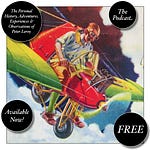
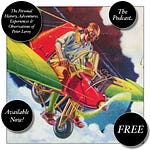
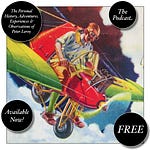
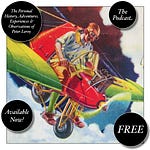

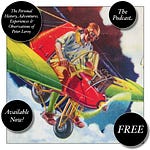
Share this post